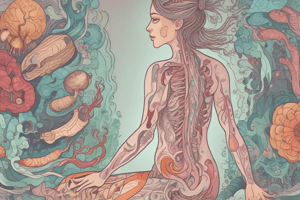Podcast
Questions and Answers
How do normal mice compare to germ-free mice in terms of fat percentage when fed the same diet?
How do normal mice compare to germ-free mice in terms of fat percentage when fed the same diet?
Normal mice have 40 percent more fat than germ-free mice with the same diet.
What impact does the transfer of microbiota have on the obese phenotype in mice and humans?
What impact does the transfer of microbiota have on the obese phenotype in mice and humans?
Transfer of microbiota influences the obese phenotype in mice and humans.
What changes in the gut microbiota have been reported in irritable bowel syndrome (IBS) patients?
What changes in the gut microbiota have been reported in irritable bowel syndrome (IBS) patients?
Changes in diversity, Firmicutes, Bacteroidetes, and Bifidobacteria have been reported in IBS patients.
Flashcards are hidden until you start studying
Study Notes
The Human Microbiome: Key Points
- The skin has about 1 million resident bacteria per square centimeter, totaling around 10^10 skin microorganisms covering the average adult.
- The skin surface can be categorized into dry, moist, and sebaceous skin, with the microbiota influenced by various factors including environmental factors, age, hygiene, and level of activity.
- Microbial colonization in infants begins with vaginal delivery, with the first major step being exposure to maternal vaginal, fecal, and skin microbiota.
- Changes in the gut microbiota occur during pregnancy, with diversity and dominance of certain bacteria adapting with gestational age to support the mother and fetus.
- Breastmilk composition includes lactose, fats, and over 200 human milk oligosaccharides (HMOs) that are metabolized by bacteria in the large intestine, particularly Bifidobacterium longum infantis.
- Mouse models are used to investigate the impact of the gut microbiome on health and development, allowing research into host genetic background, microbiota community composition, diet, antibiotic treatment, and transfer of physiological traits through fecal transplants.
- Normal mice have 40 percent more fat than germ-free mice with the same diet, and transfer of microbiota influences the obese phenotype in mice and humans.
- Obese mice and humans have more Firmicutes in their gut microbiota, and studies in obese/lean twins have shown that transfer of the gut microbiota to mice influences the obese phenotype.
- Microbiota changes have been reported in irritable bowel syndrome (IBS) patients, with no consistent microbiotic signature, but changes in diversity, Firmicutes, Bacteroidetes, and Bifidobacteria.
- Maternal immune activation (mIA) during pregnancy is associated with neurodevelopmental disorders in offspring, including autism, and can be caused by viral or bacterial infection.
- The gut microbiota can influence autistic-like behavior, as demonstrated in mice models, where anxiety-like behavior is ameliorated by feeding with B. fragilis.
- Modulation of the human microbiome through oral antibiotics decreases all microbes in the human gut, both target and nontarget.
Studying That Suits You
Use AI to generate personalized quizzes and flashcards to suit your learning preferences.




